I Am A Stubborn Person, I Will Return To Belarus
35- Natallia Radzina
- 27.11.2018, 15:00
- 89,103
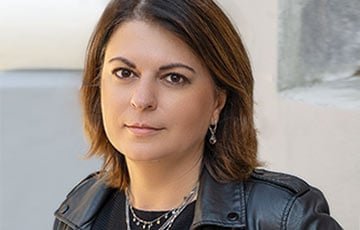
The new generation should take responsibility for the country.
A popular Polish magazine “Karta” ("Charter") published an article dedicated to the 20th anniversary of the Belarusian civil initiative and the website “Charter’97” in their November issue (№97). The magazine offered to the readers’ attention the memories of the initiative’s coordinators Andrei Sannikov and Dzmitry Bandarenka, as well as Editor-in-Chief of the website Charter97.org Natallia Radzina.
We are presenting Natallia Radzina’s story today:
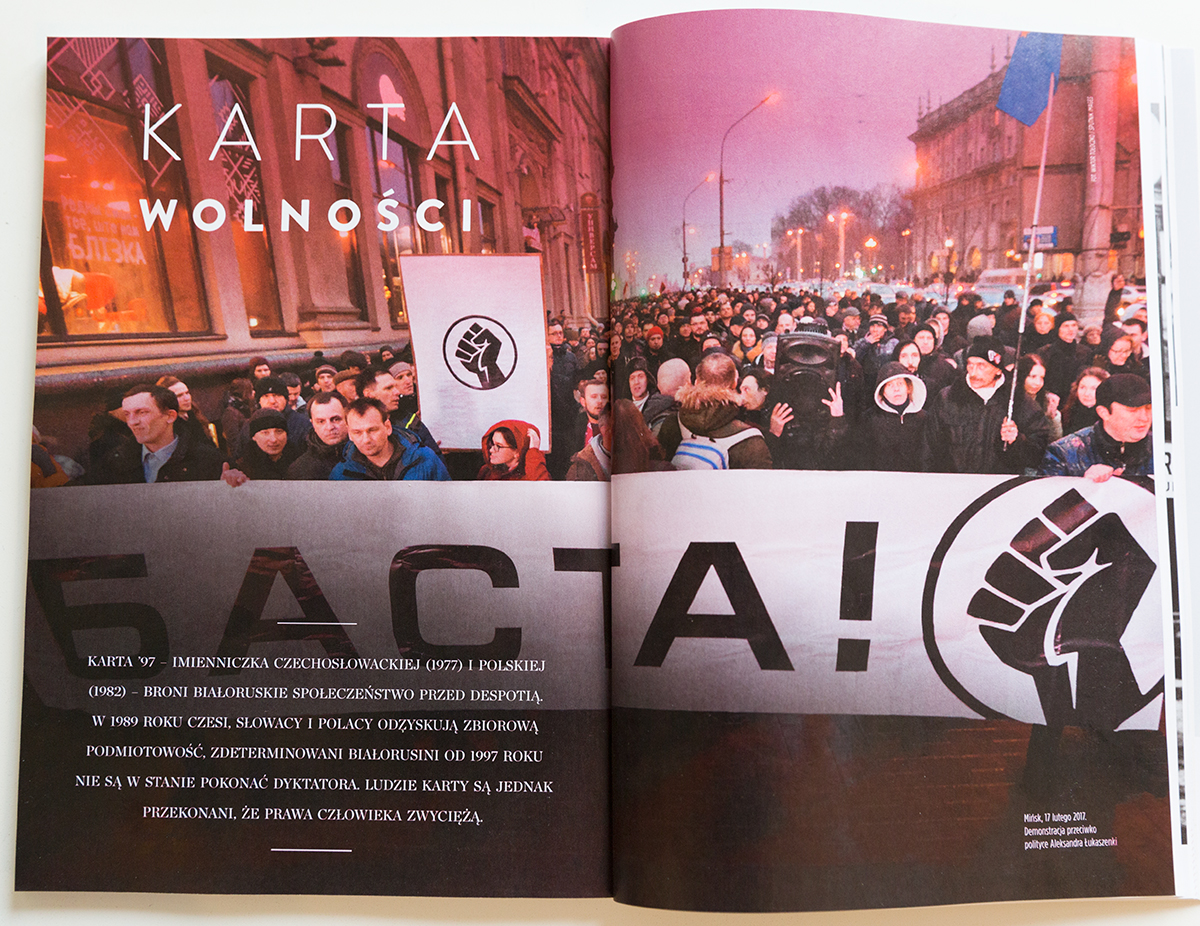
- In 1997, I signed the Charter’97 declaration. I was only eighteen back then, a student of the journalism faculty of the Belarusian State University. However, at that time I already worked for the independent newspaper “Imya”, which was then popular in Belarus. I remember the whole editorial office putting signatures under the Charter’97 declaration, all of us. It was already clear then that the authorities announced the war of extermination against independent journalists, and it was vitally important to counterstand it. The “Charter” leaders were one of the first who stood in defense of the freedom of speech in Belarus: they held protest actions, like the March of Journalists wearing stripey robes, and pickets in support of journalist Pavel Sheremet, who was arrested at the time.
Having come to power, the first thing Lukashenka did was mopping up the entire media market, having divided journalists into two categories - “honest” (which means propagandists) and “dishonest” (which means independent journalists). The “honest” ones were given huge money from the budget for praising the “wise chieftain”, their newspapers came out in huge circulations, the people were forced to subscribe for them. “Dishonest” journalists, meanwhile, were beaten at demonstrations, their newspapers were deprived of sources of financing via advertising or donations from businessmen, they were criminalized, bankrupted, closed down.
So, I had to give up my dream to work on TV – all TV channels were then controlled by the state. The only independent radio station Radio 101,2 was closed down literally a year after it had been launched. As long as there were independent newspapers, that’s where I worked. I also contributed to “Charter” from time to time – in 1998 Spokesman of the initiative Aleh Biabenin invited me to make bulletins which were distributed all over Belarus by hundreds of thousands copies. It was probably then that I realized the scale of the tragedy happening in the country. We wrote about mass human rights violations, demolition of independent trade unions, political prisoners. I was deeply shocked by the death of human rights defender Aliaksei Filipchanka, who burned himself as a protest against the judicial lawlessness…
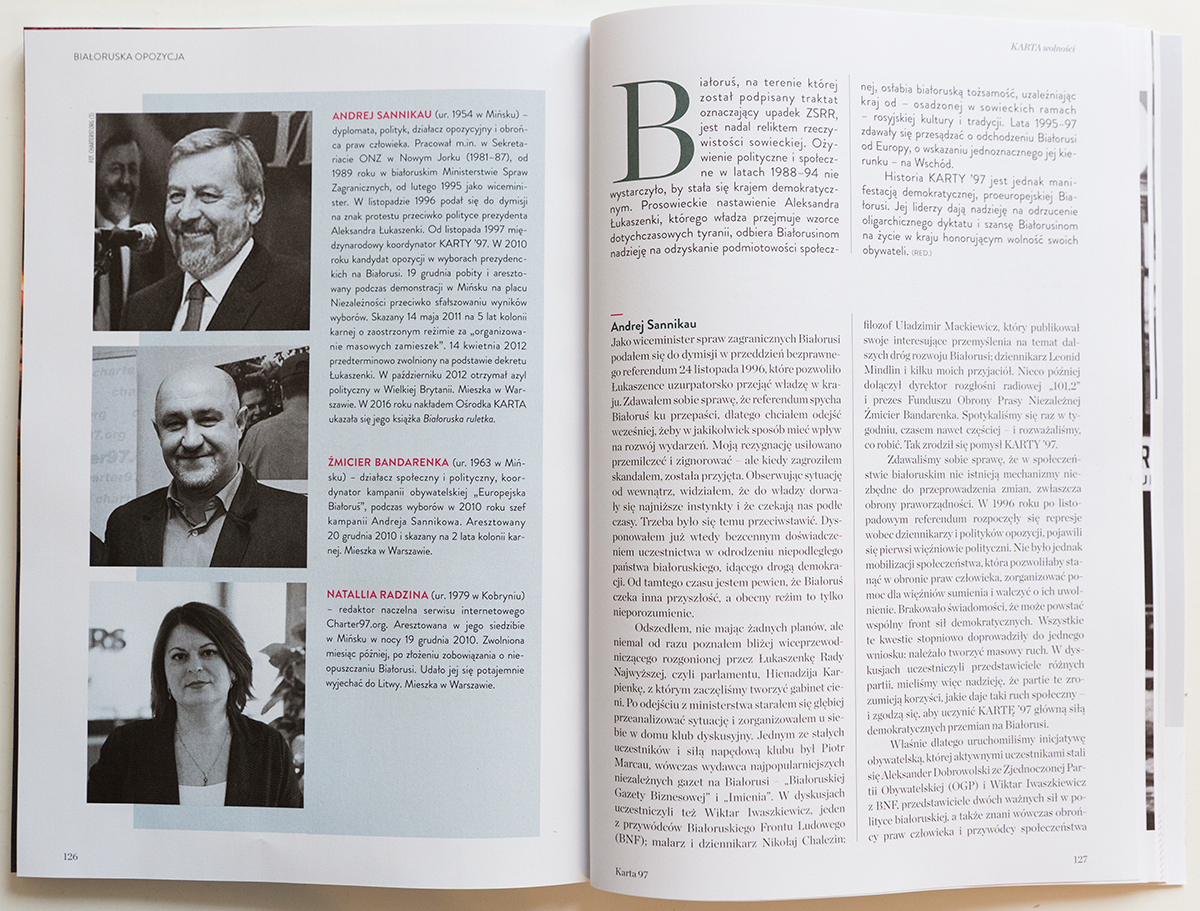
In 1999 opposition leaders Viktar Hanchar and Yury Zakharanka, whom I knew personally, were abducted and murdered. In the same year, former Vice-Speaker of the Belarusian Parliament Henadz Karpenka died under unclear circumstances. I interviewed him the day before he died. In 2000, my colleague Dzmitry Zavadzki was abducted and murdered. It became obvious that the country was ruled by a junta, ready to destroy everyone who dares to stand in its way.
In early 2000s, Lukashenka started closing independent newspapers en masse. Many journalists with whom I started in late 90s, quit the profession. Because they simply had nowhere to work, and because they realized how dangerous it was for them to write the truth, and they didn’t want to lie.
But me, no, I am a stubborn person. I really liked working as a journalist and I was not going to change my career because of some kolkhoz guy who grabbed the power. When in 2001 the authorities closed the newspaper “Nasha Svaboda” where I worked then, I started thinking what to do next. The remaining newspapers became very cautious: apart from censorship, they used self-censorship at full swing. Internet remained the only relatively free space. The reason was simple – Lukashenka did not know how to use the computer back then (although they say that he still has Charter97.org materials printed out on paper and delivered to him for consideration).
Aleh Biabenin offered me to make the website Charter97.org together with his team. I found myself a part of an unbelievable team of the same romanticists as I have always been. Andrei Sannikov, Dzmitry Bandarenka, Aleh Biabenin, Mikalai Khalezin, Ihar Berdnik, Liudmila Hraznova, Yury Khashchavatski, Valer Shchukin, Aliaksei Shydlouski became not just my colleagues, but my friends. We had one common dream – to free Belarus from dictatorship. And there was one more important thing – we believed (and we still do) that we can do it. Every one of us realized own might, we had no this stupid feeling, beaten into the heads of the Soviet people, that “a person is small and can do nothing alone”.
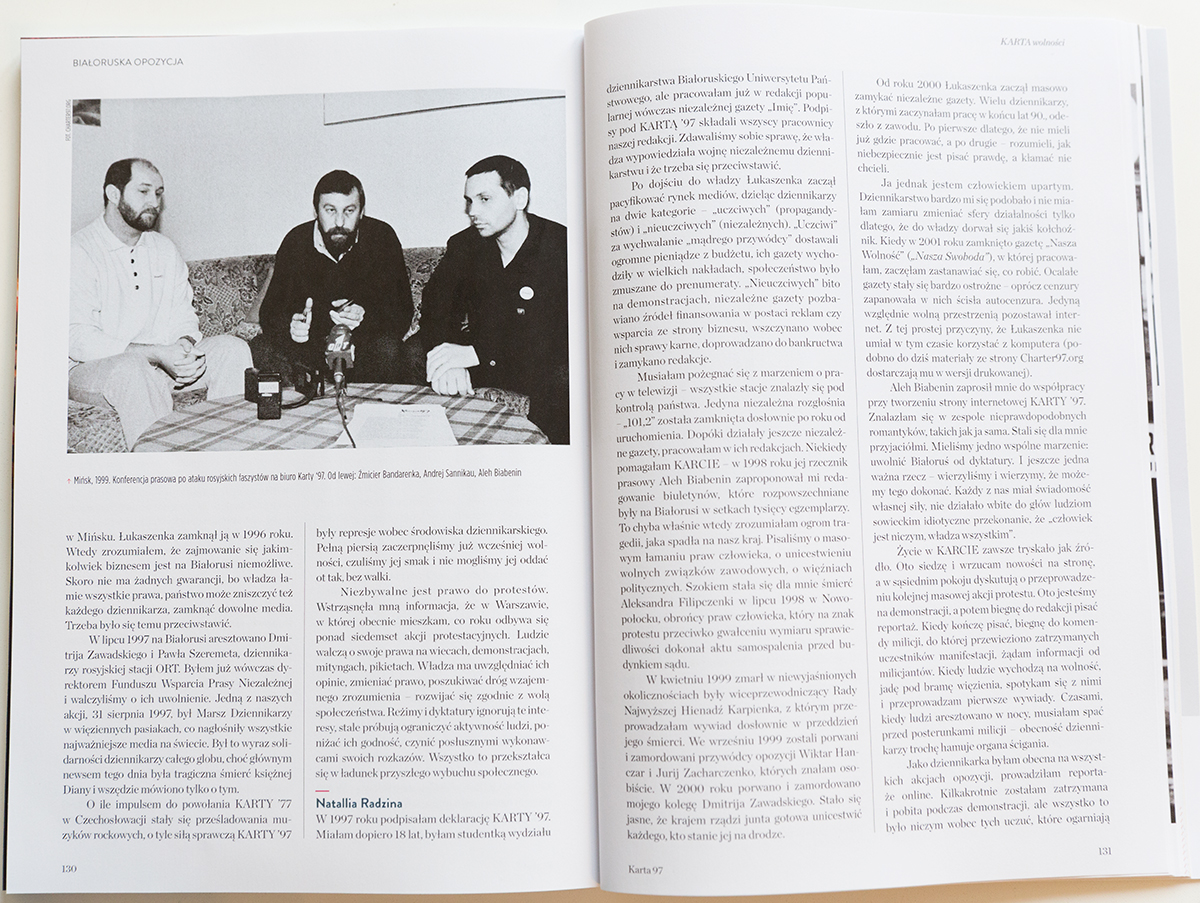
Things were always humming in the “Charter”. Here I was, writing news for the website, while the guys in the room next door were discussing organization of another mass protest action. There we were, at a demonstration, and then I went running to the editor’s office to write a report. Having written the report, I went around the police departments where the arrested protesters were held, demanded information from the police. When people got released – I met them at the prison walls, making the very first interviews at freedom. Sometimes, when people were arrested in the night time, I had to stay at the police departments for the whole night – the presence of journalists restrained the executors a little.
I saw it with my own eyes how the idea of creating the “Zubr” youth movement first occurred in the “Charter”. I knew many of its leaders and members. We energized each other and constantly moved forward. My experience of participating in electoral campaigns also was impressive. In 2006, the “Charter” team did a lot for the promotion of presidential candidate Aliaksandr Milinkevich. I remember how my colleagues and I were working at some secret apartment during the actions of protest against the falsification of that election. We did not return home, we stayed there for the night – there was so much work, the participants of the action had already placed tents in the square, it was necessary to cover the events non-stop.
I attended all the opposiition actions as a journalist, I did live reports. I was arrested and beaten at these demonstrations several times, but it all seemed no big deal compared to the feelings which possess you when you see people daring for a protest, defeating their fears. I still cannot hold back my tears when I see crowds of people chanting “Long Live Belarus!”
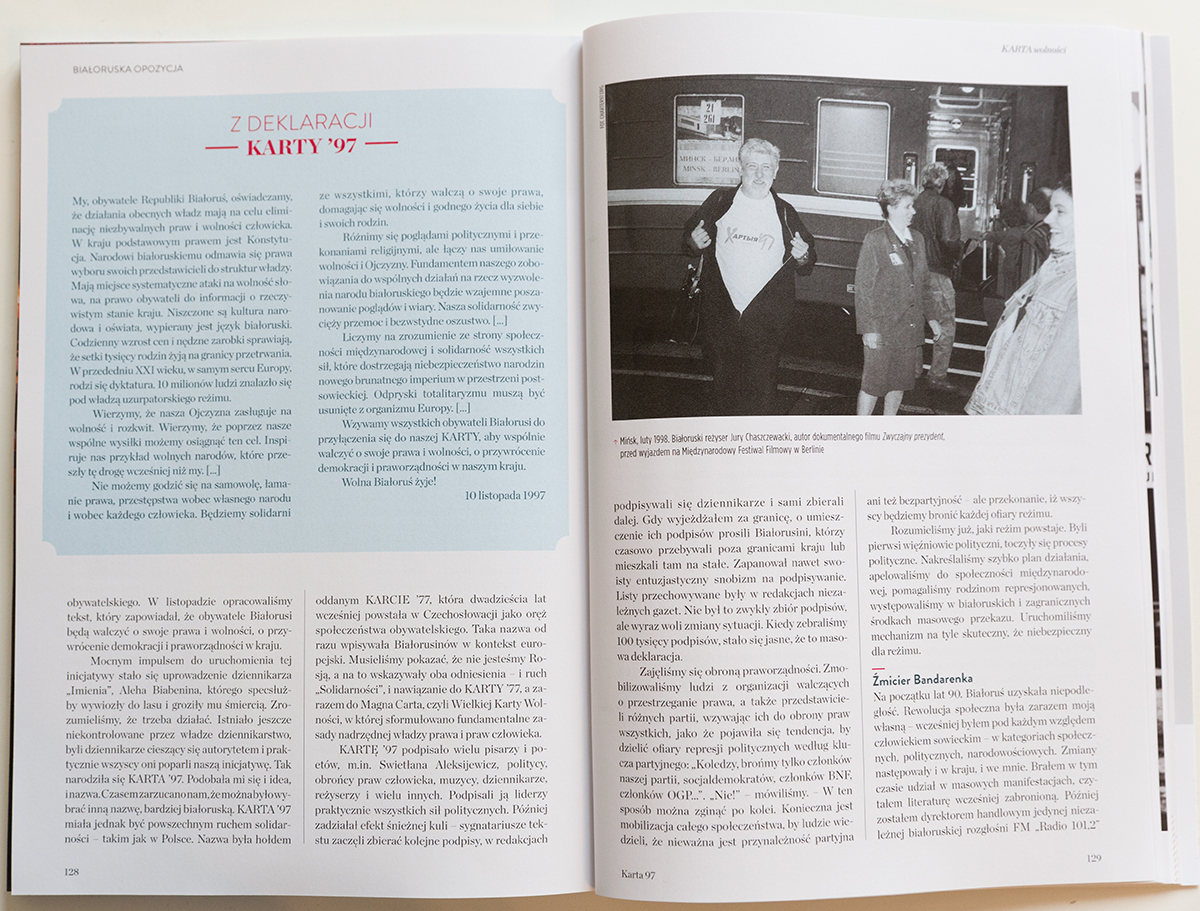
In 2010, the authorities decided to destroy us. I think there were several reasons for that. The first was the intention of founder of the “Charter’97” initiative Andrei Sannikov to run for president. As an honest, clean-fingered opposition leader, a diplomat with the experience of working in the government, a representative of the Belarusian creative elite, Sannikov was an absolute opposite of that creep Lukashenka, and, of course, posed a great threat to the latter.
The second reason for the repression, unleashed against “Charter’97”, was the growth of its popularity. We remained uncontrolled by the special services, we always called things by their proper names and did not try to survive by making compromises with the criminal regime. And we were punished for this at full swing.
In March 2010, masked policemen and riot policemen broke into the office of “Charter’97”, beat me up, seized all computers, video cameras, photo cameras. They officially started a criminal case against us for the publication of an article about one of the KGB bosses. They started summoning me for interrogations which lasted for 4 hours each and were video-recorded. In July that year, they started the second criminal case against us – this time for the readers’ comments, in which some official saw insult of his honor and dignity.
In September 2010, founder of the website Charter97.org Aleh Biabenin was murdered. This was the most horrible blow. First, Aleh disappeared and we could not contact him by phone, we started searching for him, called hospitals and police departments, we thought he was arrested. But the reality turned out much more terrible than all our fears – Aleh was found hanged in his country-house. The friends who found the body told that they saw bruises on him, his knuckles were damaged – it seemed he resisted to someone. Moreover, he was not wearing his contact lenses and there were no glasses close to the body, while Aleh was nearly blind without them, he had a -10 eyesight.
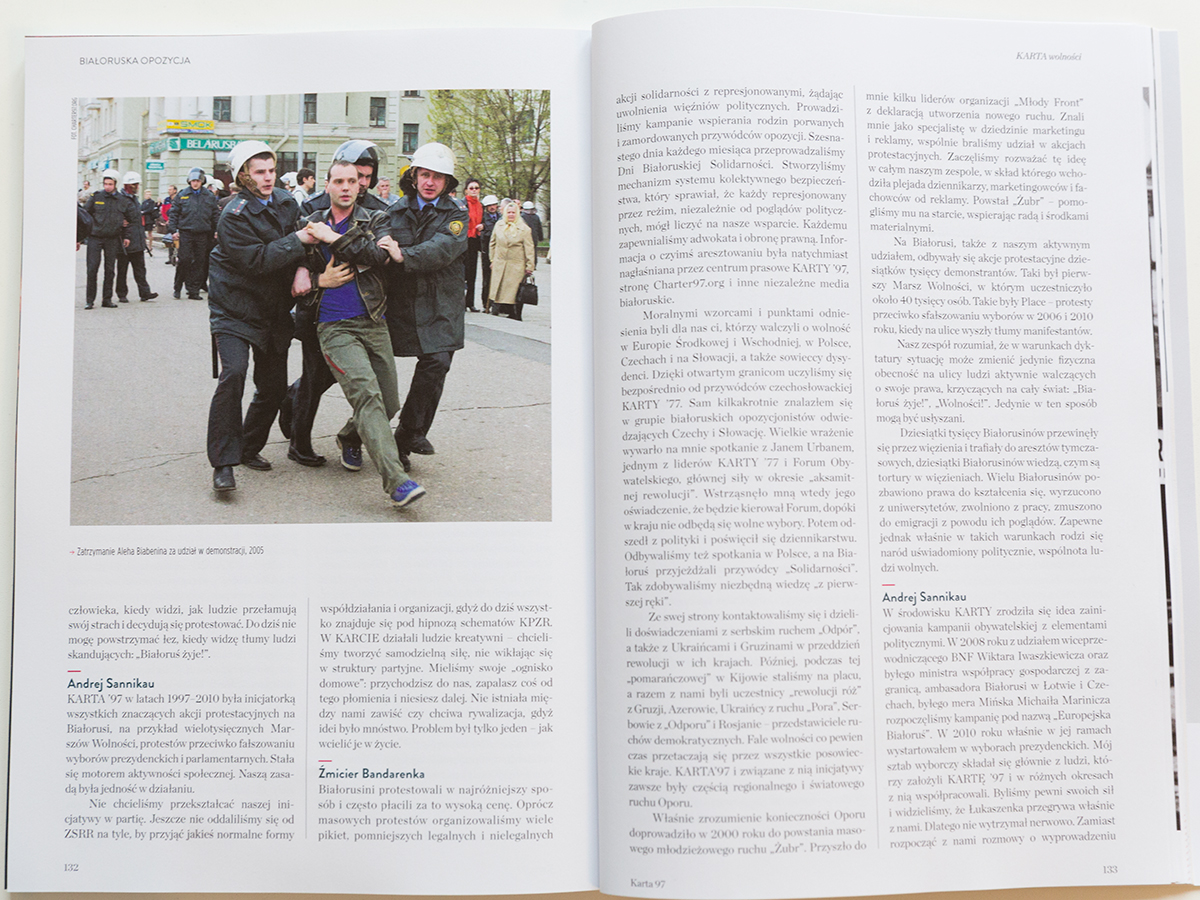
I remember when they called me and told Aleh was dead, I screamed. I vaguely remember the funeral. For the eighth year by now, I keep seeing one and the same dream, that Aleh is alive, he was hiding somewhere and finally returned. I feel so happy. But he always dies again in the end, before I am awake...
Of course I feared for my life. Anonymous threats poured on me one after another. “Radzina, get in the loop!” - there were hundreds of such messages after Aleh Biabenin’s funeral. However, I needed to pull myself together and continue working. Several months passed in the 24/7 work. Andrei Sannikov took the lead in the presidential race.
On December 19, 2010 I was in the central square of Minsk together with dozens of thousands Belarusians, who took to protest against the falsification of the presidential election results by the Lukashenka regime. The authorities threw the detachments of riot and special police against the protesters. At the moment of the clash, I was knocked down, and found myself under the special policemen’s feet, they started showering me with blows, in the head, in the back. I thought it was time to bid farewell to my life. It was a miracle that saved me – one of the protesters pulled me out of this bone-crashing mess by the hood of my jacket.
My head hurt, it was clearly a concussion. Someone was leading me to the ambulance vehicle, parked outside the square. We needed to somehow pass through the thick crowd of people standing in front of the House of Government. And then someone said “This is Charter!” The people gave way, making a corridor. We were walking through it, and the people applauded…
In the ambulance car, I saw people with blood on their heads and decided not to distract the medical staff away from more serious wounds. Then I turned around and saw a really Apocalyptic picture: the square was sealed by the soldiers of internal troops, the people were brutally beaten, grabbed and packed in huge black paddy wagons by hundreds. It was a bestial, brutal suppression of a peaceful protest. I realized I should run to the editor’s office and write, write, write…
The editor’s office was then at yet another secret apartment. I managed to work there till 4 a.m. I wrote a big report with the heading “Lukashenka Declares War Against Own People”, the phone kept on ringing – the callers reported on more and more arrests, and I published this information in the website.
At 4 a.m. the KGB officers came for us, accompanied by special policemen armed with machine-guns. All the journalists who were in the editor’s office with me were arrested. They put us in a bus with curtained windows. I remember wondering why they made everyone bend down their heads and not to look around, everyone except me. The answer was simple – they delivered me to the KGB prison, my colleagues were not supposed to know where I was. All of them were taken to the police department and sentenced to 10 to 15 days of administrative detention the following day, for no one knows what. I was placed to the KGB prison under the criminal case “organization of mass disturbances”. My “partners in crime” were 8 of 10 independent presidential candidates and members of their electoral HQs.
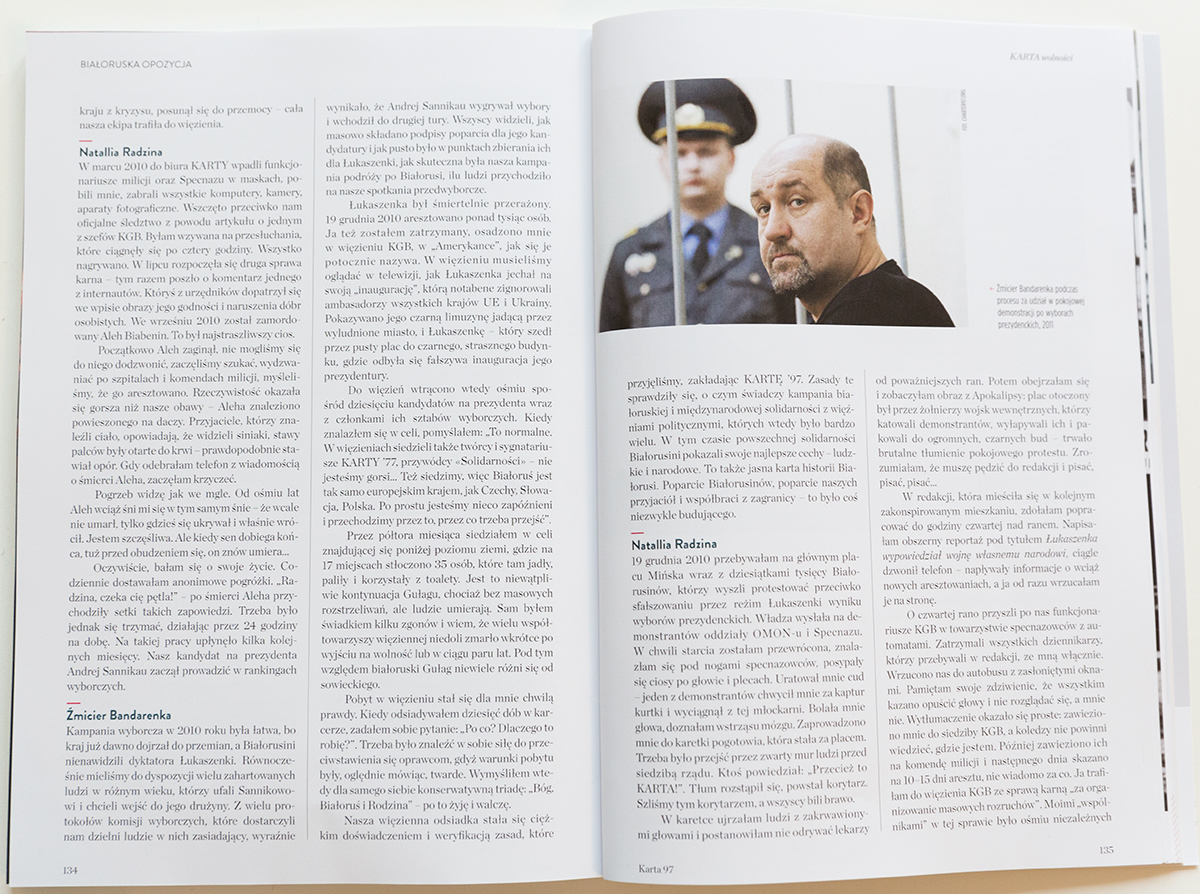
It is always hard for me to speak about prison. I don’t like to recall it. Here are some episodes though.
- Head of the Belarusian KGB remand prison Colonel Aliaksandr Arlou, during the night-time interrogation, demanded “confessionary evidence” from me, and said: “You will walk free not earlier than in five years. And I promise you – you will not be able to have kids after that.”
The first thing he did was ordering to put me in the cell without a toilet or a place to sleep on. It was January, I had to sleep on the plank on the stone floor. They convoyed me to the toilet every 4-5 hours in the daytime. But not in the time period of 10 p.m.-6 a.m., after the lockdown.
I stopped drinking water. I only allowed myself a small cup or two of tea per day, in order to get warm. Still, my body was torn down with pain. I felt my bladder would explode. Sometimes, I just couldn’t lie down at night: I sat and swayed from side to side like insane. This was immediately followed by a harsh cry of a guard, who watched us 24/7 – he ordered me to lie down because it was forbidden to sit after the lockdown.
In the end, the pains became chronic. The prison doctor examined me and told the nurse to appeal to the head of the prison in the written form, demanding to convoy my cell to the toilet more often. I remember him whispering to her: “If they don’t stop this, there will be such consequences they will surely regret it...”
There were no female guards in the whole prison at all. We, the prisoners of the KGB jail, were “guarded” only by men, mostly in black masks, armed with batons and electric stunning devices. They behaved blatantly, shouted, insulted us.
I remember my shock when, in the very first days, one of such “masks” not just convoyed, but drove me to the interrogation room like some cattle.
A gorilla-looking guard ordered me to run up the very steep and narrow stairs “face down, arms behind the back”. I was running upstairs, stumbling, nearly falling down, with tears in my eyes, and saw nothing.
It was a woman who took us to the shower once a week. She worked as a controller and also in the prison chancellory and library. When she was on sick leave, those “guards” in black masks took us to the “sauna”. There was a window in the shower door, it was not supposed to be shut. While we tried to shower within that short limit of time, the entire shift gathered under that window. I felt dirty and humiliated after such showers. Male guards also watched women through the toilet wicket.
The light in the cells was on 24/7. It was forbidden to cover one’s face with a kerchief or a blanket so that the bulb wouldn’t beacon right in the eyes. If we did this, they could peep into the cell and demand we should uncover our faces.
It was cold. There was a small grated window under the ceiling. I was twice as cold – the cold came from the stone floor. They gave us blankets, but it was difficult to get warm under them.
Because of this, my bronchitis has passed into the chronic stage. I did not have time to recover, as I fell ill again. The cold tap water, with which I had to wash the dishes, the floors in the cell, and rinse the laundry, contributed to this.
It is better not to get sick in the Belarusian prison at all. No, of course, they won't let you die - too much paperwork later. But you will not be treated. Instead of the obvious concussion after being beaten in the square, the prison doctor diagnosed me with “adaptation to the conditions of the cell”. And this is despite the fact that there was blood coming from the ears. When the headaches became unbearable, they called an ambulance, but, despite the recommendations of the doctors who arrived to the remand prison, they did not allow me to go to the hospital for an X-ray. They only gave me a pain-killer pill.
It’s not air that you breathe in the cell, but dust, which has accumulated in the thick layer on radiators closed by nets for decades. Having washed in the morning, in the evening, rubbing the face with a cotton, you notice that it is black.
And most importantly, in prison they convince you that you are a subhuman, a beast. Their goal is to destroy your human dignity. You can forget who you were when free. Here, you are a nobody. A creature without rights, with which they can do anything. And this message is conveyed to you by everyone: the guards, the administration, the operatives, the investigators - every day, hour, minute.
When you go to the interrogation with your head down and hands behind your back (men were also taken in handcuffs), when personal searches and “shakedowns” in the cell are carried out several times a week, during which all your things are searched, when they check each pad and pour out even tea from the boxes. When they arrange a "carousel" and the whole prison in a week moves from cell to cell in a circle. And this means that at the very least, the organized life is collapsing, and in 10 minutes you may have to collect all the things, a heavy mattress with a pillow and even a wooden “bunk” and move into another dirty cell. In this case, you are ordered to go “with things”, without specifying where. The heart stops at the thought that they could actually release you, and then again, again in the abyss of hopelessness and despair.
It does not matter that you are not yet convicted, that you are in the remand prison, your guilt has not been proven. For them, you are already a criminal, a goner, with whom there is no point in standing on ceremony.
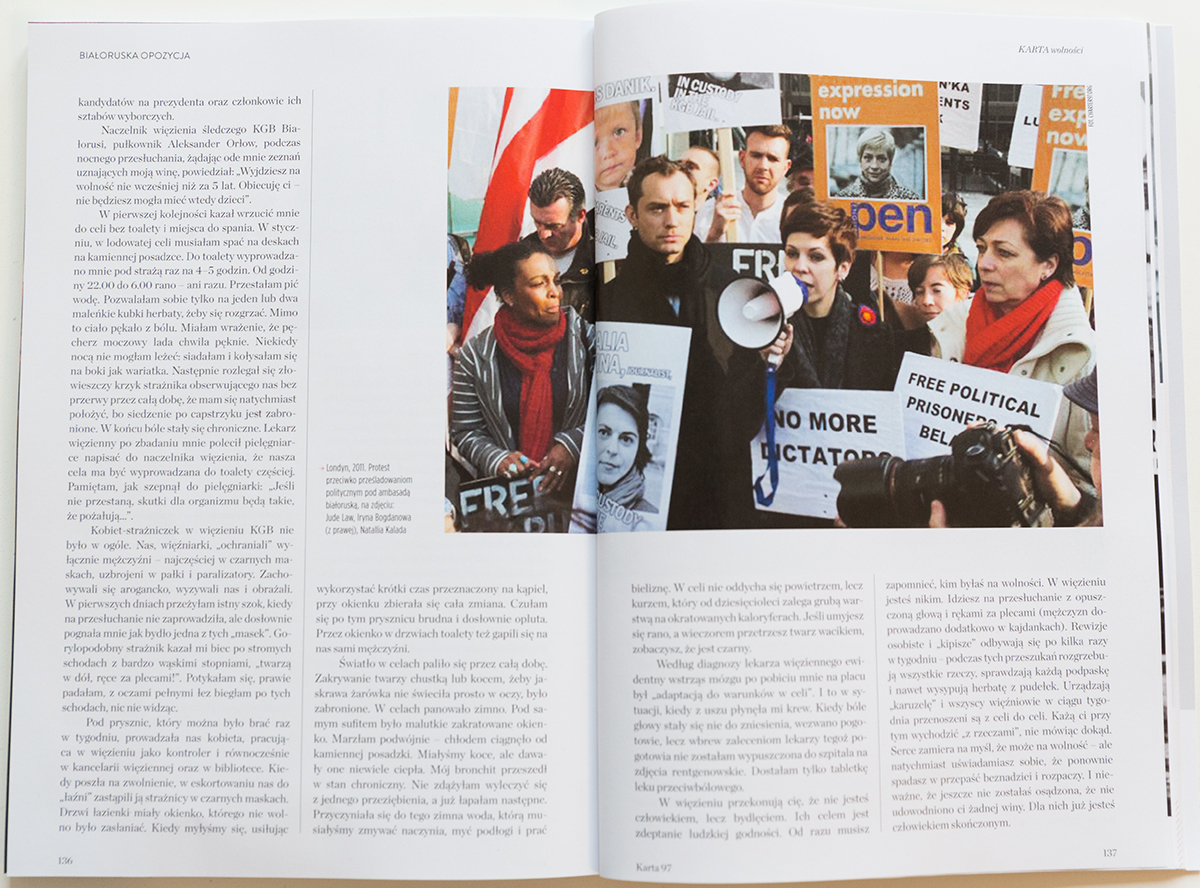
I lived like this for almost two months. Then there was another two months under a written undertaking not to leave the place – they forbade me to live in Minsk and sent me to the town where my parents lived – Kobryn. I lived there and continued to work as the editor of the website “Charter-97” under the supervision of the police and the KGB. I was waiting for the trial. I faced 15 years in prison. But I understood that even if the article was re-qualified and that they gave me not a real, but a suspended sentence, I would be under the constant control of the special services and would not be able to work freely.
I decided to escape. Without the passport - it was taken away from me in the KGB prison and was not returned. My escape is another long story for which the pages of the magazine are not enough. It was difficult, long and scary. Thanks to the help of the UN Refugee Agency, the US Department of State, and Russian human rights activist Svetlana Gannushkina, I was taken to the West through Moscow. I received political asylum in Lithuania, in 2012, at the invitation of the Polish Foreign Ministry, the Charter’97 website started working from Warsaw.
For the past 6 years, we have been working in Poland. I am eternally grateful to this country for support. This is real happiness to work and not to be afraid that the special police would break into the editorial office or home to beat you up or kill you. And I really want to go home to Belarus. Because I still believe that we have the strength to change everything. The new generation must take responsibility for the country.
It will be recalled that on September 3 editor-in-chief of Charter-97 Natallia Radzina announced the threat to informational resource cause by drastic reduction in financing and called readers for solidarity. Ways to support the website:
DONATION VIA PAYPAL:
MULTI-CURRENCY ACCOUNT FOR ASSISTANCE:
Bank's name: Bank Millennium S.A.
Address: ul. Stanislawa Zaryna, 2A, 02-593, Warszawa
IBAN: PL 97 1160 2202 0000 0002 1671 1123
SWIFT: BIGBPLPW
Name of the account holder: Fundacja “KARTA ‘97”
Purpose/title of payment: Donation for statuary aims
You can contact us by the e-mail [email protected]









